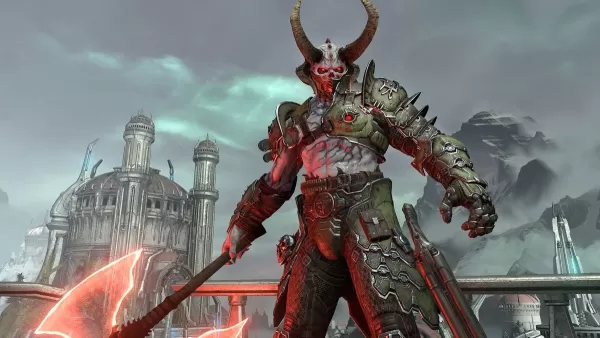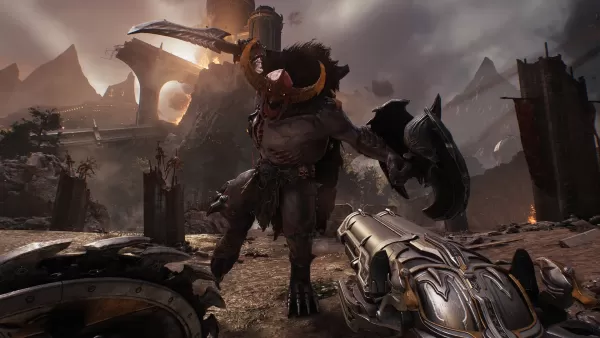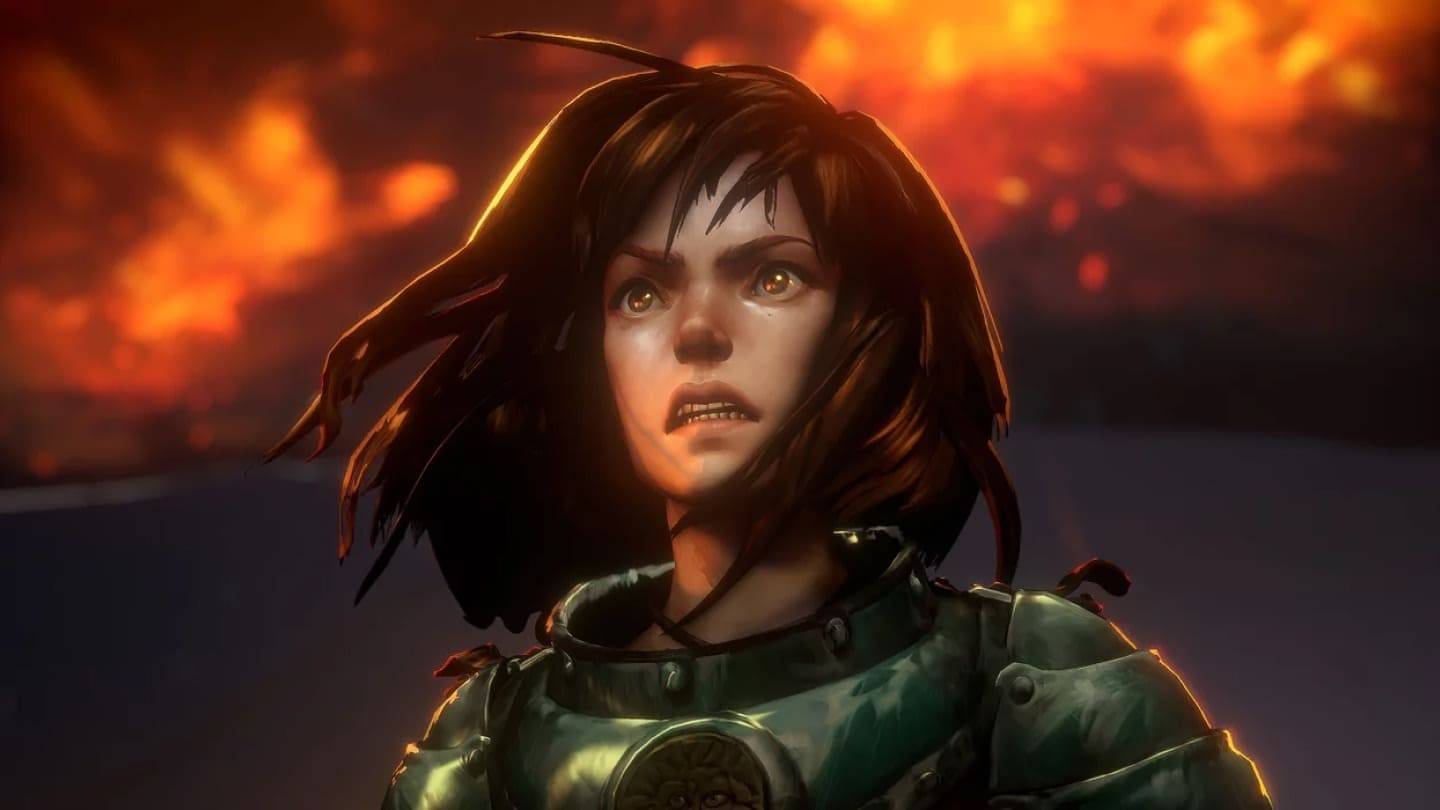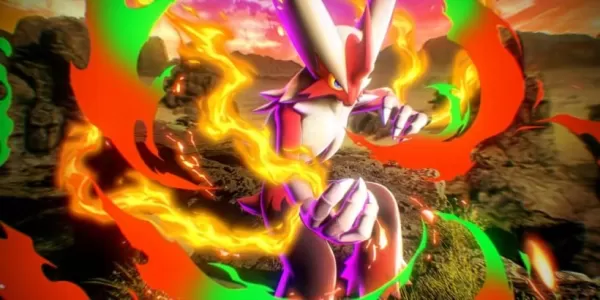When director Hugo Martin described the guiding principle behind *Doom: The Dark Ages* as “stand and fight” during Xbox’s Developer Direct earlier this year, it immediately caught my attention. This concept stands in stark contrast to the gameplay of id Software’s previous title, *Doom Eternal*, which thrived on fast-paced, constantly mobile combat. Yet, within *Eternal*, there was one enemy that already demanded a more grounded approach — the Marauder. Often considered the most divisive foe in any Doom game, the Marauder is despised by many… but cherished by me. And when I discovered that the key to mastering *The Dark Ages* lay in reacting to bright green cues — the exact same mechanic used to defeat the Marauder — I was completely hooked.
Rest assured, *The Dark Ages* doesn’t trap you in a head-to-head duel with an enemy as fast and finicky as *Eternal’s* Marauder. While the Agaddon Hunter does pose a serious challenge with its shield and punishing melee combos, the real influence of *Eternal’s* intense battles isn't tied to a single enemy — it's embedded in the entire combat system. Rethought and refined, the core ideas behind the Marauder have been integrated into the foundation of *The Dark Ages*. The result? Every enemy encounter carries the tactical depth of a Marauder showdown — minus the frustration.
The Marauder is unlike any other enemy in *Doom Eternal*. Most fights involve darting around arenas, slicing through weaker enemies, and bouncing between tougher foes. In fact, *Eternal* has often been likened to a resource management game, not just in terms of ammo and health, but also in how you manage space and movement. That all changes when the Marauder appears. This relentless axe-wielding brute demands your full attention — which is why it typically appears in solo duels. Even when it shows up in larger battles, the best strategy is to evade its attacks, clear out lesser demons, and then finally face off directly.
 Doom Eternal's Marauder is one of the most controversial enemies in FPS history. | Image credit: id Software / Bethesda
Doom Eternal's Marauder is one of the most controversial enemies in FPS history. | Image credit: id Software / Bethesda
Of course, “standing and fighting” doesn’t mean standing still — this *is* *Doom Eternal*, after all. Instead, it’s about controlling the battlefield through smart positioning. Get too close, and the Marauder can blast you with a nearly un-dodgeable shotgun shot. Stay too far back, and he’ll pepper you with easier-to-avoid projectiles while keeping you out of axe range. But here’s the twist: you *want* him to swing his axe, because that’s the only moment he becomes vulnerable. His energy shield absorbs every bullet until the axe wind-up animation begins. When his eyes flash a vivid green — that’s your signal. You’ve got a split second to unload and take him down.
This same visual cue — a flash of green — plays a pivotal role in *Doom: The Dark Ages*. As a nod to the original *Doom*, demons unleash chaotic volleys of projectiles. Among them are special green missiles that can be parried using the Doom Slayer’s new shield, sending the attack back at the attacker. Early on, this ability serves mainly as a defensive maneuver. However, once you unlock the shield’s rune system, parrying evolves into a powerful offensive weapon — capable of stunning enemies with electric shocks or activating your shoulder-mounted auto-targeting cannon.
As you progress through *The Dark Ages*, your battles become a series of tightly controlled one-on-one engagements against a diverse roster of demonic foes. Unlike the Marauder, where survival hinged entirely on those green flashes, success in these fights can also come from using your standard tools effectively. However, mastering shield runes makes parrying one of your strongest skills — one worth triggering repeatedly. If you incorporate it into your playstyle, you’ll find that the underlying principles of *The Dark Ages’* parry system share deep DNA with *Eternal’s* Marauder encounters. You must maintain optimal distance (since demons won’t fire at point-blank range), position yourself correctly when green indicators appear, and react swiftly to land the parry. All of this requires focus, turning every arena into a collection of intimate, high-stakes duels. You stand and you fight — just like before.
One of the biggest complaints about the Marauder was how it disrupted the flow of *Doom Eternal*. It forced players to abandon the techniques they’d mastered for every other enemy type. To some, that felt jarring — but to me, that’s exactly what made the Marauder so thrilling. While the rest of the game asked you to dance gracefully, the Marauder demanded you breakdance. *Eternal* redefined first-person shooter design by making players rethink weapons, resources, and engagement styles. The Marauder broke even those new rules, offering the ultimate test of skill. While I relish that challenge, I understand why many found it frustrating.
 The Agaddon Hunter may be the most Marauder-like enemy in The Dark Ages, but every demon has a little bit of Eternal's most fearsome foe in them. | Image credit: id Software / Bethesda
The Agaddon Hunter may be the most Marauder-like enemy in The Dark Ages, but every demon has a little bit of Eternal's most fearsome foe in them. | Image credit: id Software / Bethesda
*Doom: The Dark Ages* addresses this issue by ensuring that each unique combat rhythm feels like part of a broader symphony of battle. Each major enemy type features its own distinct green projectile or attack pattern, requiring you to adapt your tactics accordingly. The Mancubus, for instance, fires staggered bursts of wide energy beams with green pillars at either end — forcing you to weave side to side to successfully parry each one. The Vagary launches an abacus-style volley of deadly spheres, compelling you to sprint toward the rows you can deflect as if dodging tennis balls flying across the court. Meanwhile, the skeletal Revenant channels the spirit of the Marauder more closely; it’s invulnerable until you deflect one of the green skulls it periodically fires from its shoulder launchers.
Because each demon demands a different kind of movement and reaction, no new enemy ever feels out of place or disruptive. Sure, the Agaddon Hunter and Komodo present steeper challenges due to their aggressive melee combos, but by the time they appear, you’re already accustomed to adjusting your positioning and reflexes on the fly. That wasn’t the case with the Marauder, since *Eternal’s* design philosophy centered around using the right gun for the right demon — not the positional awareness and timing required to beat such a unique threat.
The truth is, the Marauder wasn’t flawed in design — it was simply ahead of its audience. Players weren’t ready for something that broke the rules so drastically. *Doom: The Dark Ages* prepares you for similar challenges by making reactive, twitch-based mechanics a consistent part of the overall experience rather than an unexpected twist halfway through the game. This shift does reduce the overall difficulty — the parry window in *The Dark Ages* is much more forgiving than the hair-trigger response needed to counter the Marauder’s eye flash, even on higher difficulties. But the core idea remains intact: locking in with an enemy, waiting for the perfect moment, and striking when the light turns green. It’s present in every single battle. *The Dark Ages* offers a fresh interpretation, but the essence is unmistakably familiar. You stand and you fight.









